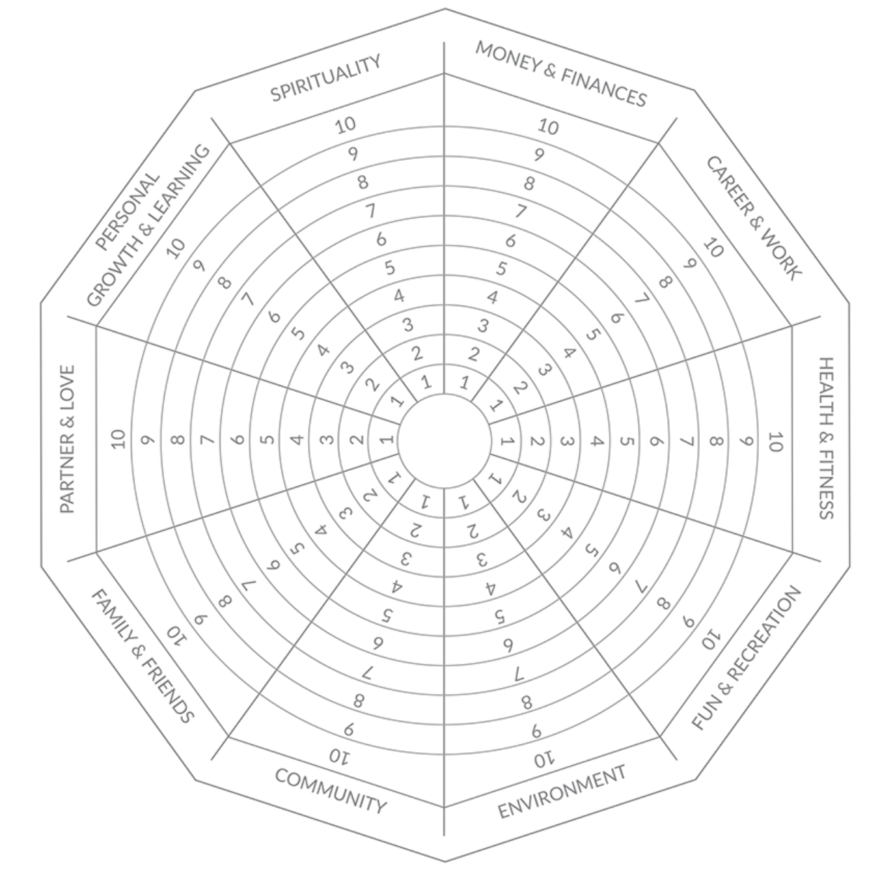
When it’s time to welcome a new health coaching client, you need more information in order to coach them in a truly meaningful fashion.
That’s where the essential exchange of an intake form comes into play. This form contains the client information you’ll refer to throughout the coaching relationship, and, along with the possibility of implementing other assessments, they offer a variety of benefits during your partnership.
Those benefits do come with a healthy dose of caution, which is why we’ve compiled this list of Pros and Cons, for coaches and for clients, in regards to using assessments in your health coaching business.
There are many types of assessments coaches use to support the client’s self-awareness and pave a more dependable path towards their vision and goals…
The Most Common Assessment Types For Health and Wellness Coaching:
- New Client Intake Form (example below)
- Life Balance/Satisfaction Wheel (image below)
- Character Strengths and Gifts
- Holistic Wellness Status
- Personality Type
- Health Risk Assessment (for coaches in a clinical setting)
- Readiness for Change (TTM Stages of Change)
What’s the Difference Between an Intake Form and an Assessment?
All coaches use some type of intake form when onboarding a new client. The intake form used for one-on-one coaching can be quite robust, asking clients to provide information on a wide range of topics related to their health and lifestyle like their diet, goals, sleep, habits, expectations, motivations, etc…
Here are some example Intake Form questions and answers from our curriculum at The Primal Health Coach Institute:
The intake form is something a coach refers to, periodically, throughout the relationship. It provides a baseline snapshot of the client’s health, well-being, personal preferences, and idiosyncrasies that make the client unique.
Although intake forms are often referred to as an assessment, they technically differ in a significant way: Assessments aim to evaluate or draw conclusions, by definition, whereas an intake form is simply for gathering information.
Assessments typically have a scoring analysis or result drawn based on the client’s answers, whereas intake forms do not. Another common way intake forms and assessments differ is that the intake form covers a broad scope of wellness-related factors, whereas most assessments niche down to one focus—like a sleep assessment or a personality assessment.
In today’s article, we address both intake forms and assessments, because they each have a valuable role to play in the coach-client journey.
5 Tips for Using Assessments and Intake Forms as a Health Coach
- Make most assessments optional to the client. Considering the fact that intake forms are typically required, and lengthy, making other assessments optional helps emphasize client autonomy—which is necessary for effective coaching and successful change endeavors.
- Search for the positives. When reviewing any intake/assessment answers, highlight the areas your client is already succeeding. Don’t just look for problem areas, look just as hard for the advantages and strengths, plus all the things they’re doing right.
- Assume that every answer on an intake/assessment is only a snapshot of the client’s situation. Humans are complex, emotional beings, and it benefits you as the coach to consider that there’s more to the story. Any answer requires a discussion before drawing plans or conclusions.
- Highlight meaningful quotes for later. Especially when using an intake/assessment in which clients answer in their own words, highlight any impactful statements so you can quickly find them whenever your client needs a motivational reminder or contemplative prompt.
- Consider the client’s stage of change. Do you see clues indicating your client’s readiness for change? Consider how that might influence your coaching strategy so that you readily meet your client where they’re at.
The Cons of Using Assessments and Intake Forms
Cons for Coaches
- We’re tempted to draw conclusions or make wrongful assumptions, which can take away from organic discovery and collaboration.
- Coaches put on their “expert hat” or go into “fix it” mode, instructing the client regarding what they need to, or should, do.
- After reviewing assessment results or the intake form submission, coaches are tempted to begin sessions with the problem areas. Focusing on what’s going well, instead, is encouraging for the client and nurtures their self-efficacy.
- When an assessment reveals disturbing information—like major trauma or loss, for instance—coaches may experience pity and express sympathy to the client, inviting rumination during the coaching session as a result.
- Assessment/intake answers are not always accurate or tell the whole story. Clients may complete them under rushed time constraints, for example, and their answers may not reflect their circumstances in a broader scope.
- It’s quite a common reaction for coaches to feel propelled into a premature plan of action. Assessments are helpful as guides, but they become unhelpful when they introduce an agenda that presumes the appropriate path or triggers resistance in the client.
Cons for Clients
- Some clients will not share the true details of their habits or experiences on an intake form or assessment simply because they feel the desire to impress or avoid disappointing the coach.
- If your client is busy and stressed from existing obligations, they may see the assessments as homework—another responsibility on their to-do list, which adds to their overwhelm.
- When a client senses their autonomy being challenged, they may begin to resist your full support due to an instinctive reaction towards being told what to do.

The Pros of Using Assessments and Intake Forms
Pros for Coaches
- An intake form, or relevant assessment, can help establish trust early on while laying the groundwork for a growth-promoting relationship. It also helps shape the first coaching session without any prior conversations needed.
- Once submitted by the client, the intake form saves precious coaching time for more meaningful interaction during sessions.
- The answers help notify the coach of any red flags or warning signs in areas like self-destructive patterns of behavior, mental health risks, or the need for a referral.
- Forms and assessments give the coach opportunities to spot discrepancies, whether it’s between what the client said on one question vs. another, or confirming which goals they truly prioritize.
- Learning about the client in advance is an opportunity to demonstrate acceptance and coaching empathy, even without a history of meaningful interactions together.
- Health-related questions can provide hints about how engaged and knowledgeable a client is regarding their health—or, PAM, a measurable level of interest, understanding, and participation a person takes in their own healthcare.
- Comprehensive intake forms/assessments help clients realize how many factors and domains actually influence their health, well-being, and challenges.
- The process of answering assessments/intake forms helps foster more self-awareness in the client. The International Coaching Federation identifies “creating awareness” as a core coaching competency because progress depends on the client’s expanding awareness of what’s possible. This cannot be done for them, they must experience it themselves.
Pros for Clients
- One top benefit for clients is the stimulation of self-reflection that occurs when they complete these requested forms, articulating their unique needs and experiences. Learning more about themselves in this format can be fun and fulfilling.
- Forms help clients see the difference between where they are and where they want to be.
- The process of intentionally answering questions about their lives and desires promotes self-discovery in your client—especially when it comes to priorities, readiness, and challenges—which further fosters self-awareness and insights needed for transformational change.
- In-session assessments can feel like an interrogation, which is why it’s so valuable to use digital assessments/intake forms and save precious session time for meaningful conversations.
- Digital forms provide clients with a safe space to first tell their “story.” More introverted clients, or those who rarely express feelings and desires aloud, tend to feel more comfortable sharing in writing—especially when they have time to ponder their answers prior to meeting.
- The experience of writing their goals and summarizing their current state of well-being can be a powerful motivator for action.
- Targeted assessments that align with the client’s most pressing concerns help the client feel supported and assured they’re with the right coach. It can also feel as though progress has already begun.
Coaches, remember this: we work with clients in the moment. Things may have shifted since our client completed the forms, and it’s our duty to remain open and ever-curious about where their interests and energy may lead each session. The coach’s aim is to co-create their path to success rather than showing up as the expert, teacher, or advisor…especially when it comes to one-on-one health coaching. The client is, after all, an expert in their own life.



